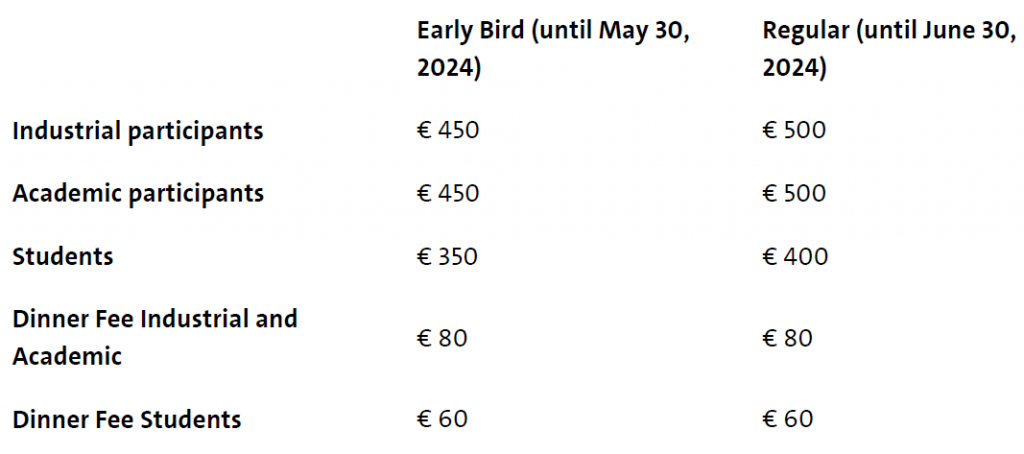ATMOS 2024: 24th Symposium on Algorithmic Approaches for Transportation Modelling, Optimization, and Systems
Royal Holloway, University of London in Egham
London, UK, September 5-6, 2024
Conference website: https://algo-conference.org/2024/atmos/
Submission link: https://easychair.org/conferences/?conf=atmos2024
SCOPE
The 24th Symposium on Algorithmic Approaches for Transportation Modelling, Optimization, and Systems (ATMOS 2024) will be part of ALGO 2024 (https://algo-conference.org/2024/), which will take place at the Royal Holloway, University of London in Egham, United Kingdom. ATMOS is scheduled on 5-6 September 2024.
Since 2000, ATMOS brings together researchers and practitioners who are interested in all aspects of algorithmic methods and models for transport optimization. The symposium provides a forum for the exchange and dissemination of new ideas and techniques. The aim of making transportation better gives rise to very complex and large-scale optimization problems requiring innovative solution techniques and ideas from algorithms, mathematical optimization, theoretical computer science, and operations research.
ATMOS PLENARY TALK
SPEAKER: Eduardo Uchoa, Universidade Federal Fluminense, Niteroi, Brazil
TITLE: Exact Algorithms for Vehicle Routing: advances, challenges, and perspectives
ABSTRACT: The vehicle Routing Problem (VRP) is among the most widely studied problems in operations research and combinatorial optimization. The current state-of-the-art exact VRP algorithms employ a combination of column generation and cut separation, known as Branch-Cut-and-Price (BCP) algorithms. This presentation examines notable recent contributions made by various researchers in the field. Additionally, the talk showcases VRPSolver, a very flexible package that implements a BCP algorithm that achieves outstanding performance for many routing, packing, and scheduling problems. Furthermore, VRPSolverEasy, a recent Python application built on top of VRPSolver, is introduced. While heuristic algorithms are likely to remain the dominant approach for practical routing, the availability of exact solutions for reasonably sized instances opens up new possibilities.
IMPORTANT DATES
Submission deadline: Sunday June 30, 2024 (AoE)
Notification to authors: July 31, 2024
Camera ready submission: August 7, 2024
Symposium: September 5-6, 2024
TOPICS
The symposium welcomes but is not limited to papers addressing the following topics:
- Congestion Modelling and Reduction
- Crew and Duty Scheduling
- Demand Forecasting
- Delay Management
- Design of Pricing Systems
- Electromobility
- Infrastructure Planning
- Intelligent Transportation Systems
- Models for User Behaviour
- Line Planning
- Mobile Applications for Transport
- Mobility-as-a-Service
- Multi-modal Transport Optimization
- Routing and Platform Assignment
- Route Planning in Road and Public Transit Networks
- Rostering
- Timetable Generation
- Tourist Tour Planning
- Traffic Guidance
- Vehicle Routing
- Vehicle Scheduling
The symposium welcomes but is not limited to papers applying and advancing the following techniques: Algorithmic Game Theory, Approximation Algorithms, Combinatorial Optimization, Graph and Network Algorithms, Heuristics and Meta-heuristics, Mathematical Programming, Methods for the Integration of Planning Stages, Online and Real-time Algorithms, Simulation Tools, Stochastic and Robust Optimization.
SUBMISSIONS
Authors are invited to submit high-quality manuscripts reporting original unpublished research in the topics related to the symposium. Simultaneous submission to other journals or conferences with published proceedings is not allowed. By submitting a paper the authors acknowledge that, in case of acceptance, at least one of the authors will register at ALGO/ATMOS 2024, attend the conference on-site, and present the paper.
Submissions must be in the form of a single PDF file prepared using the LaTeX OASIcs style file (https://www.dagstuhl.de/en/publishing/series/details/oasics) and must be submitted electronically via the EasyChair submission system (https://easychair.org/conferences/?conf=atmos2024).
ATMOS 2024 accepts two types of submissions, both of which will be reviewed with the same quality standards by the Program Committee.
(a) REGULAR PAPER SUBMISSIONS: A regular paper submission should clearly motivate the importance of the problem being addressed, discuss prior work and its relationship to the paper, explicitly and precisely state its key contributions, and outline the key technical ideas and methods used to achieve the main results. A regular paper submission should not exceed 12 pages including title page and abstract, but excluding references and an optional appendix. Authors should include all necessary details in their submission so that the Program Committee can judge the correctness, importance and originality of their work. Any material (e.g., proofs or experimental results) omitted (from the main part of 12 pages) due to space limitations can be put into the optional appendix, which will be read at the Program Committee’s discretion. Regular papers will be allotted up to 20 pages in the proceedings.
(b) SHORT PAPER SUBMISSIONS: A short paper submission may present preliminary results or work-in-progress on a specific topic. Authors should clearly motivate the importance of the problem being addressed, discuss prior work and its relationship to the paper, explicitly and precisely state the paper’s key contributions, and outline the key technical ideas and methods used to achieve the main claims. A short paper submission should have at least 4 and at most 6 pages. Authors should provide sufficient details in their submission so that the Program Committee can judge the correctness, importance and originality of their work. Short papers will be allotted upto 6 pages in the proceedings.
PROCEEDINGS
The proceedings will be published on the Dagstuhl Open Access Seriesin Informatics (OASIcs) publication service.
PROGRAM COMMITTEE
Paul Bouman (co-chair), Erasmus University Rotterdam, Netherlands
David Coudert, INRIA and Université Côte d’Azur, France
Mattia D’Emidio, University of L’Aquila, Italy
Twan Dollevoet, Erasmus University Rotterdam, The Netherlands
Daniele Frigioni, University of Aquila, Italy
Loukas Georgiadis, University of Ioannina, Greece
Marc Goerigk, University of Passau, Germany
Andrew Goldberg, Amazon, USA
Vera Grafe, TU Kaiserslautern, Germany
Irene Heinrich, TU Darmstadt, Germany
Spyros Kontogiannis (co-chair), University of Patras, Greece
Jesper Larsen, Technical Universtity of Denmark, Denmark
Niels Lindner, Zuse Institute Berlin, Germany
Philine Schiewe, Aalto University, Finland
Sabine Storandt, University of Konstanz, Germany
Rolf van Lieshout, Eindhoven University of Technology, The Netherlands
STEERING COMMITTEE
Alberto Marchetti-Spaccamela, Sapienza Università di Roma, Italy
Marie Schmidt, Universität Würzburg, Germany
Anita Schöbel, University of Kaiserslautern-Landau, Germany
Christos Zaroliagis, University of Patras, Greece (Chair)
CONTACT
All questions about submissions should be emailed to the PC co-chairs:


